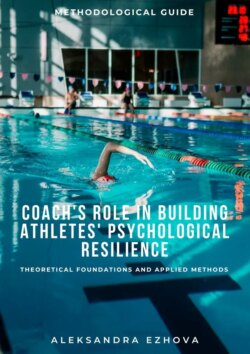Читать книгу Coach’s role in building athletes’ psychological resilience. Theoretical foundations and applied methods - - Страница 5
Chapter 1. Theoretical foundations of developing psychological resilience in athletes
1.2. Factors influencing an athlete’s psychological resilience
1.2.1. Physiological and personality characteristics
ОглавлениеThe development of psychological resilience largely depends on an athlete’s innate physiological traits. According to the biopsychological model proposed within the framework of neuropsychological research, key factors influencing stress resistance include the type of nervous system, the level of activation of cortical and subcortical structures, and biochemical processes responsible for regulating emotions and responses to stress [13].
Different athletes exhibit varying levels of tolerance to stress loads, which are determined by individual characteristics of the central and autonomic nervous systems, hormonal profile (levels of cortisol, adrenaline, and noradrenaline), and the speed of recovery processes (table 1) [14].
Table 1. Physiological factors of stress resilience
Athletes have varying tolerance to stress loads, which is determined by individual characteristics of the central and autonomic nervous systems, hormonal profile (levels of cortisol, adrenaline, and noradrenaline), and the speed of recovery processes.
These physiological factors also affect the athlete’s ability to maintain performance under continuous physical and emotional stress. Accurate profiling of these parameters facilitates enhanced individualization of training and adaptation tracking. Emotional regulation mechanisms and cognitive control are also critical in maintaining stability under competition.
Different sports impose specific demands on an athlete’s psychophysiological characteristics. Therefore, temperament largely determines predisposition to certain disciplines, influencing concentration ability, stress resilience, and motivation levels (table 2) [15].
Table 2. The influence of temperament on predisposition to sports
Thus, temperament plays a significant role in the adaptation of an athlete to sports competition, stress resistance, concentration capacity, and performance level in severe conditions. Choosing a sport corresponding to the psychological characteristics of an individual optimizes the process of training, reduces psycho-emotional stress, and enhances athletic performance.
Additionally, the degree of anxiety, emotional lability, and cognitive capabilities also matters. Increased anxiety exerts a detrimental effect on the athlete’s concentration potential, stress-based decision-making ability, and self-regulation during competitions. Good cognitive abilities in reappraisal of stress-inducing situations, self-regulation, and awareness of emotional response, in contrast, are sound indicators of adaptation in sport.
According to a study [16] conducted among 273 athletes (aged 12 to 34, selected through random sampling), a significant relationship was identified between anxiety, self-confidence, and concentration. The analysis revealed four key factors influencing stress resilience: cognitive anxiety (24.83% of total variance), somatic anxiety (11.86%), self-confidence (15.49%), and concentration (11.05%). It was found that athletes with high levels of cognitive anxiety more frequently exhibited decreased concentration and struggled more with stress. At the same time, self-confidence served as a protective factor: athletes with higher self-confidence levels had significantly lower anxiety and better concentration.
Based on the Mann – Whitney U test, a significant gender difference was found in cognitive indicators, self-confidence, and concentration. Women experienced higher cognitive anxiety (11.67 ± 3.97 vs. 9.26 ± 3.23 in men), while men demonstrated higher self-confidence (19.54 ± 3.08 vs. 17.47 ± 3.74 in women).
The study verified that the well-documented cognitive reappraisal skill of stressful events, self-regulation, and familiarity with emotional responses are key to the successful adaptation of athletes. Athletes who employed cognitive self-regulation strategies on a regular basis (reframing, attention control, success visualization) possessed 23% higher rates of concentration during competitions and 17% reduced anxiety levels compared to the control group. Particular stress management instruction and self-esteem skills contribute to enhance enhanced sporting performance and resilience to stress in pressure situations.
Physiological characteristics, including some level of physical fitness, rate of recovery, and hardness, also have an important role to play in psychological resilience in sport. Studies affirm that fitter athletes exhibit more stable emotion regulation, which relates to the capacity of the body to adapt against stress and smaller biochemical reaction to stress.
A review of scientific studies [17] confirmed that regular physical activity reduces cortisol levels by an average of 0,37 standard deviations. This influence indicates a moderate but statistically significant decrease of the stress hormone, which results in reduced psycho-emotional tension. The meta-analysis included 10 RCT with a sample of 756 individuals, predominantly women (90%). Various methods of cortisol measurement were used in the studies (saliva, blood), but regardless of the method, intervention groups showed a significant decrease in hormone levels in comparison with control groups.
Thus, psychological resilience of a sportsman is largely characterized by his or her physiological characteristics, degree of physical preparedness, and endogenous nervous system characteristics forming a foundation for adaptive self-regulation mechanisms during severe physical and mental stress. Besides personal biological characteristics, social conditions engage in stress resistance, e.g., communication with coaches, team members, and parents.
